Access to a variety of AP Inter 2nd Year Sanskrit Model Papers Set 7 allows students to familiarize themselves with different question patterns.
AP Inter 2nd Year Sanskrit Model Paper Set 7 with Solutions
Time : 3 Hours
Max.Marks : 100
Note :
- All questions should be attempted.
- Question Nos. 1, 2 and 3 should be answered either in the medium of instructions of the candidate or in Sanskrit (Devanagari Script) only.
- The remaining questions should be answered in Sanskrit (Devanagari Script) only.
सूचना :
प्रथम, द्वितीय, तृतीय प्रश्नान् विहाय अन्ये सर्वेऽपि प्रश्नाः संस्कृत भाषायामेव समाधातव्याः ।
1. एकस्य श्लोकस्य प्रतिपदार्थं भावं च लिखत ।
अ) पृथिव्यां त्रीणि रत्नानि जलमन्नं सुभाषितम् ।
मूढैः पाषाणखण्डेषु रत्नसंज्ञा विधीयते ॥
समाधान:
पदच्छेद (Word Division) : पृथिव्यां त्रीणि, रत्नानि, जलं, अन्नं, सुभाषितम्, मूढैः, पाषाणखण्डेषु, रत्नसंज्ञा, विधीयते ।
अन्वयक्रमः पृथिव्यां जलं अन्नं, सुभाषितं त्रीणि, रन्तानि मूढैः, पाषाणखण्डैः, रन्तसंज्ञा, विधीयते ।
अर्था (Meanings) : पृथिव्याम् = On the earth, जलम् = water, अन्नम् = food, सुभाषितम् = and wise saying, त्रीणि = are the three, रत्नानि = gems, मूढैः = a fool, पाषाणखण्डेषु = to stones, रत्नसंज्ञा the name of gem, विधीयते = gives.
भाव (Substance) : Water, food and wise saying these three are the gems on the earth. But, a fool gives the name of a gem to a piece of stone.
आ) अर्थानामार्जनं कार्यं वर्धनं रक्षणं तथा ।
भक्ष्यमाणो निरादायः सुमेरुरपि हीयते ॥
समाधान:
पदच्छेद (Word Division) : अर्थानां, आर्जनं, कार्यं, वर्थनं, रक्षणं, तथा, भक्ष्यमाणः निरादायः सुमेरुः, अपि, हीयते ।
अन्वयक्रम : अर्थानां, आर्जनं, वर्धनं, तथा रक्षणं, कार्यं, निरादायः, भक्ष्यमाणः, सुमेरुः, अपि, हीयते ।
अर्था (Meanings) : अर्थानाम् = of wealth, money; आर्जनम् acquisition; वर्धनम् = increase, growth; तथा = and; रक्षणम् = protection; कार्यम् = is to be done; भक्ष्यमाण: = if eaten; निरादायः without income; सुमेरुः + अपि = even the golden Meru Mountain; हीयते = will shrink.
भाव (Substance): One should acquire, increase and protect wealth. If eaten, without augmenting, even the Meru Mountain will shrink.
2. एकं निबन्धप्रश्नं समाधत्त ।
अ) विभीषणोपदेशः इति पाठ्यभाग सारांशं लिखत ।
Answer:
Introduction: The lesson Vibhishanopadesa is an extract from the Yuddhakanda of the Ramayana, written by Valmiki. Vibhishana advises Ravana to send Sita to Rama.
The Advice of Vibhishana: Vibhishana advised Ravana that one should use their might only when the three other methods namely sama, dana and bheda fail. Then also it would work again the weak and already unfortunate enemies. They should not underestimate the enemy. परेषां सहसावज्ञा न कर्तव्या कथञ्चन | They should protect lives. They need not have an unnecessary fight with one who followed Dharma. Sita should be sent to Rama.
Vibhishana advised Ravana to abandon his anger which would destroy his comfort and dharma. Ravana should follow dharma which would increase joy and fame.
The Inauspicious signs: Vibhishana mentioned the various inauspicious signs witnessed since the arrival of Sita. “The milk of the cows has decreased. The mighty elephants have lost their rut. The horses are neighing piteously. The donkeys, camels and mules are shedding tears losing their hair. Flocks of crows are cawing harshly on all sides. Cruel animals have assembled at the gates of the city, and are roaring loudly.”
He compared Sita with a serpent. She had the hood of bosom, poison of worry, fangs of smile, heads of five fingers and a great body. He warned that Ravana would not be spared with life by Rama. Even the Sun, Indra, Yama and other could not protect him.
Friends, who were like enemies : Vibhishana accused the Rakshasas saying that they were enemies in the guise of friends. He said that a minister should weight the strength, loss and gain on both sides, and give a beneficial advice. He asked whether anyone could stand before the arrows of Rama. He advised that Sita should be sent to Rama along with precious gifts.
When Ravana said that he would not have spared if this speech was made by any other person, Vibhishana became angry. He flew in to the space, and said that as a brother Ravana could say anything, but he would not forgive him. He said that people who spoke sweetly could be found easily. But those who gave bitter but beneficial advice, and its listener were hard to be found. पथ्यस्य वक्ता श्रोता च दुर्लभः | He wished him happiness, and left.
![]()
आ) सा मातृभूमिर्मम इति पाठ्यभागसारांशं लिखत ।
Answer:
Introduction: The lesson Sa Matrubhumirmama was written by Dorbala Prabhakara Sarma. The poet describes the greatness of India in this poem.
Vedabhumi, Jnanabhumi and Dharmabhumi: The poet praises the motherland as a land of Vedas, wisdom, languages, gods, dharma, action, yoga, tapas, rivers, holy places and great people. Here, the cattle of the Vedas show the right path.
The people here are cultured, intelligent, healthy and sweetly speaking. यत्रैताः हृदि जागृताः प्रकृतयः सा मातृभूमिर्मम | The land is prosperous, waters are pure, breeze is purifying and life is friendly. There are Rik mantras that praise the gods, Yajush mantras that are used in sacrifices, Atharva mantras that show the path of prosperity. This land is full of knowledge with the Vedas, Upanishads,
Puranas, Itihasas, Kavyas etc. विद्या यत्र परोपकारविभवाः सा ज्ञानभूमिर्मम | There are different languages belonging to Vanga, Anga, Andhra, Kerala, Maharashtra, Sindhi, Gujarati, Karnataka etc.
Selfless People: The gods of rivers, villages, cities, towns, households, lands and others bestow boons. The lords of quarters such as Indra, Agni, Varuna, Vayu, Kubera, Yama etc. along with Vishnu, Uma and others grant welfare to the people. In a household, the mother takes care of the interests of her husband and children, father works, brothers give relief, teachers preach and the elders offer advice. ग्रमे यत्र गृहे समैक्यपरता सा धर्मभूमिर्मम | The people work selflessly, are engaged in meditation, prayers and contemplation. The wisdom of the sages ensures the welfare of the world, strengthens culture and enriches the knowledge.
Rivers and holy places: Rivers like Ganga, Yamuna, Saraswati, Godavari, Krishna, Narmada etc. remove sins, diseases and obstacles. Mountains such as Hemadri, Rajatadri, Aravali, Mahendra, Himalayas, Sahya etc. embellish this land. There are holy cities such as Kasi, Ayodhya, Puri, Kanchi, Madhura, Avanti, Tirupati, Ahobilam etc. Great sages and poets like Vyasa, Valmiki, Bhrigu, Sankara, Kalidasa, Bhavabhuti etc. belonged to this land.
3. एकं निबन्धप्रश्नं समाधत्त ।
अ) विक्रमस्य औदार्यमिति पाठ्यभागस्य सारांशं लिखन्तु ?
Answer:
Introduction: The lesson Vikramasya Audaryam is taken from vikramarkacharitam written by Sivadasa. When Bhoja wants to ascend the throne of Vikrama the statue on the fourth step tells this story about the generosity of king Vikrama.
The childless Brahmin:
While Vikramaditya ruled Ujjaini, there was a learned Brahmin in that city, who was virtuous, but who had no children. Once, his wife said to him that there was no heaven for one who had no children सत्पुत्रेण कुलं नृपेण वसुधा लोकत्रयं भानुना | The Brahmin worshipped Lord Siva. The god appeared in his dream and asked him to perform Pradoshavrata. The Brahmin did so and he begot a son, whom he named Devadatta. When his son grew up, the Brahmin performed his marriage, and went on a pilgrimage to Varanasi.
Devadatta’s help to Vikrama:
Once Devadatta went into the forest to collect fuel sticks for sacrifice. At that time, king Vikrama came to the forest for hunting. There he asked Devadatta the way to the city, even though he knew it.
Devadatta himself led him to the city. The king praised him, and appointed him in his court. One day the king praised Devadatta’s help in the assembly saying that he could never repay his debt.
Devadatta kidnaps the prince:
Devadatta wondered whether the king’s praise was true or false. He wanted to test the words of the king. He kidnapped the prince, and gave one of his ornaments to his servant and sent him to the market to sell it. The king’s men who were searching for the prince caught him, and brought him to the king. When the king asked him, the servant said that he was Devadatta’s servant. The king sent for Devadatta, who said that he killed the prince or money. The members of the court said that Devadatta should be sentenced to death. But the king said that Devadatta rescued him in the forest. One should not find faults in those dependent on him. dy महतां गुणदोषचिन्ता | He said that his son died because of his previous deeds only. He honoured Devadatta and sent him away.
Devadatta returned with the prince, and told the king that he wanted to test the words of the king. He praised the generosity of the king, who said that one should not forget the help done to him. यः कृतमुपकारं विस्मरति स एव पुरुषाधमः ।
Thus the statue told Bhoja about the generosity of king Vikrama.
आ) वेङ्कटरावस्य स्वभावं संग्रहेण लिखत |
Answer:
Introduction: The lesson Bhishajah Bhaishajyam was written by Prof. Pullela Sriramachandra. It is taken from his Sriramachandra-laghukavya-sangraha. This lesson describes the story of a selfish doctor, and the fruit he reaped for his selfishness.
‘The Villager’s Plea: One day some villagers came to Dr. Venkata Rao, and requested him to attend to a boy who was injured in an accident. Venkata Rao childed them for not coming in time. वैद्योऽपि मानव एव | He accused them of trying to get treatment done without paying fee. He insulted them saying the boy would be delicate as the baby of a donkey. When they left as the boy was serious क्षणे क्षणे किल परिक्षीयते बालस्य दशा, Venkata Rao thought nothing would happen if one puppy died.
The poor and intelligent Venkata Rao: Venkata Rao was the son of a poor farmer. He was very intelligent and secured a seat in medical college. His father sold their agricultural land for his education. A rich man married his daughter to Venkata Rao. Venkata Rao’s practice also picked up. Along with money, the three defects grew in him. They were considering others as insects, himself as god, and accepting others praise as the truth. When he spoke of his father as a beggar, his father left him and returned to their village.
Marriage was also a business affair for Venkata Rao. fast नाम. वणिग्व्यवहार एव । For him money was everything. He never loved his wife. His son Suresh alone became the object of his affection.
Desire for Power: Venkata Rao thought that money was useless without power. He became an MLA twice. But he could not become a minister. He was unhappy about that. He could not win the seat the third time. He blamed the people for that. His hatred for people grew.
Manjuhasini, the Lady Doctor: At that time, Dr. Manjuhasini joined the government hospital there. She was Venkata Rao’s classmate in medical college. She rejected Venkata Rao’s advances. Venkata Rao was hoping that she might have changed now as he became rich.
The death of his son : Venkata Rato received a phone call from Manjuhasini requesting his help in an emergency case. His driver tried to inform him that his son was not there at the school when he went there after getting the brake repaired. Venkata Rao cut him short saying that the boy would have reached home. But when he went to the hospital he saw the same villagers who came to him earlier in the day, and the body of his dead son.
![]()
4. त्रयाणां प्रश्नानां समाधानानि लिखत ।
अ) द्रोणडुपयोः सम्बन्धः कीदृश: ?
समाधान:
द्रोणद्रुपदयोः स्नेहबन्धः अच्छेद्यः अविभाज्यः च । सः पटुचिक्कणात्मकः अभवत् ।
आ) कर्णभारं केन विरचितम् ?
समाधान:
कर्णभारं भासेन विरचितम् ।
इ) भृगुवंशकेतुः कः ?
समाधान:
भृगुवंशकेतुः परशुरामः ।
ई) बालानां कलहः कीदृश: ?
समाधान:
बालानां कलहः तत्कालीनः भवति । बालाः कलहायन्ते अनन्तरं क्रीडन्ते च ।
उ) कालिदासेन उक्तस्य श्लोकस्य भावः कः ।
समाधान:
अहं खादन् न गच्छामि, हसन् न जल्पामि गतं न शोचामि कृतं न स्मरामि, द्वयोः संभाषणमध्ये न प्रविशामि । तेन कथम् अहं मूर्खः भवामि ।
ऊ) कालिदासश्लोके भोजेन प्राप्तं समाधानं किम् ?
समाधान:
कालिदासश्लोकेन भोजेन प्राप्तं समाधानम् एवम् अस्ति-द्वयोः सम्भाषणकर्त्रीः मध्ये सूचनां विना न प्रविशेत् इति ।
5. द्वयोः संदर्भ व्याख्यानं लिखत ।
अ) अप्रियस्य च पथ्यस्य वक्ता श्रोता च दुर्लभः ।
समाधान:
परिचयः एतत् वाक्यं विभीषणोपदेशः इति पाठ्यभागात् स्वीकृतम् । एषः पाठः रामायणस्य युद्धकाण्डात् गृहीतः । अस्य कविः वाल्मीकिः ।
सन्दर्भः प्रदीयतां दाशरथाय मैथिली इति रावणं प्रति उपदिशन् विभीषणः एवं वदति ।
भावः लोके प्रियवादिनः जनाः सुलभाः भवन्ति । परन्तु अप्रियस्य हितस्य वक्ता, श्रोता च दुर्लभः एव ।
आ) चित्रार्पितारम्भ इवाऽवतस्थे ।
समाधान:
परिचयः एतत् वाक्यं ‘धर्मनिष्ठा’ इति पाठ्यभागात् स्वीकृतम्, एषःभागः कालिदासस्य रघुवंश महाकाव्ये पञ्चमसर्गात् स्वीकृतः ।
सन्दर्भः दिलीपः सिंहं प्रति एवं उक्तवान् ।
भावः पृथिव्यादि भूतविकारेषु शरीरेषु अनपेक्षा खलु ।
विवरणम्ः हे सिंह ! मम थशोरुप शरीरे दयालुः भव । देहं अशाश्वतम्, कीर्तिरेव शाश्वतम् ।
इ) यत्रैताः हृदि जागृताः प्रकृतयः सा मातृभूमिर्मम ।
समाधान:
परिचयः एतत् वाक्यं सा मातृभूमिर्मम इति पाठ्यभागात् स्वीकृतम् । अस्य कविः श्रीमान् दोर्बल प्रभाकरशर्मा |
सन्दर्भः मातृभूमेः वैशिष्ट्यं वर्णयन् मम मातृभूमिः ज्ञानभूमिः धर्मभूमिः इति वदन् कविः एवं वर्णयति ।
भावः मम मातृभूमिः क्षेमकरी, तत्र जलं शुचि, जीवनं स्नेहात्मकं, मनः सुरचनं इति कविः वदति । यत्र प्रकृतयः हृदि अवबोधितः सा मम मातृभूमिः इति कविः वदति ।
ई) वाच्याः कथं मातृपदेन चान्याः ।
समाधान:
परिचयः गतत् वाक्यं ‘नित्रविंशतिः’ इति पाठ्यभागात् स्वीकृतम्’ अस्य पाठ्यभागस्य रचयिता जटावल्लभपुरुषोत्तम शास्त्री ।
सन्दर्भः गीर्वाणवाण्याः वैभवं वर्णयनन् कविः एवं वदति । या भाषा लोके प्रसारिता, माता इव रक्षति सा एव मातृभाषा इति कथ्यन्ते ।
भावः कथं अन्यभाषाः मातृभाषा इति कथ्यन्ते ।
विवरणम्ः संस्कृतभाषा सर्वासां भाषाणां जननी, सा भाषा मातेव रक्षति ।
6. द्वयोः ससंदर्भ व्याख्यानं लिखत ।
अ) मृत्युर्वै प्राणिनां ध्रुवः ।
समाधान:
परिचयः एतत-वाक्यं, “मन्दविषसर्पकथा” इति पाठ्यभागात् स्वीकृतम् अस्य पाठ्यभागस्य रचयिता नारायणपण्डितः ।
सन्दर्भः पुत्रशोकं अनुभवन्तं कौण्डिन्यं कपिलः प्रति एवं अवदत्
भावः सर्वेषां प्राणिनां मृत्युः निश्चयम्
विवरणम्ः जातस्य मरणं, मृतस्य जननं निश्चयम्, अतः सर्वेषां प्राणिनां मृत्युः ध्रुवम् ।
आ) यः कृतमुकारं विस्मरति स एव पुरुषाधमः ।
समाधान:
परिचय : इदं वाक्यं “विक्रमस्य औदार्यम्” इति पाठ्यभागात् स्वीकृतम् । अस्य पाठस्य रचयित शिवदास ।
सन्दर्भ : राज्ञः वचनं क्षुत्वा एकः एवं अवदत् ।
भाव : यः कृतं उपकारं विस्मरति सः मानवः पुरुषाधमः भवति ।
विवरणम् : नारिकेल वृक्षः पीतं तोयं स्मृत्वा नरागां अमृततुल्यं जलं ददाति यः मानवः परैः कृतं उपकारं विस्मरति सः मानवः पुरुषाधमः भवति ।
![]()
इ) क्षणे क्षणे किल परिक्षीयते बालस्य दशा ।
समाधान:
परिचयः – वेङ्कटरावस्य भिषजो भैषज्यम् इति पाठ असित अस्य पाठस्य रचयित, श्री पुल्लेल श्रीरामचन्द्रः ।
सन्दर्भः – एकः वृद्धः युवकं उद्दिश्य एवं अवदत् ।
भावः – क्षणे क्षणे परीशील्यमाने बलकस्य दशा क्षीयत ।
विवरणम्ः – वृया अनेन कलहेन, बालकस्य परिस्थितिः सीयते ।
ई) राजा तं कनकाभिषेकेण सत्कृतवान् ।
समाधान:
परिचय : एतत् वाक्यम् अप्पय्यदीक्षितेन्द्र इति पाठ्यभागात् स्वीकृतम् । अस्य रचयित्री सङ्का उषाराणी ।
सन्दर्भ : अप्पय्यदीक्षितः शिवार्कमणिदीपिकां अरचयत् । तदा राजा चिनबोकनायकः तं कनकाभिषेकेण सत्कृतवान् । तेन हिरण्येन अप्पय्यः स्वग्रामे शिवालयं निर्मितवान् ।
भाव : राजा अप्पय्यदीक्षितं कनकाभिषेकं कृत्वा सम्मानितवान् ।
7. त्रयाणां प्रश्नानां समाधानानि लिखत ।
अ) कदा प्रभृति अशुभानि निमित्तानि दृश्यन्ते ?
समाधान:
यदा प्रभृति सीता आगता तदा प्रभृति अशुभानि निमित्तानि दृश्यन्ते ।
आ) दिलीपेन सेव्यमानं नन्दिनीधेनुं कः चकर्ष ?
समाधान:
दिलीपेन सेव्यमानं नन्दिनीधेनुः सिंहः चकर्ष ।
इ) सर्वेन्द्रियाणां प्रधानं किम् ?
समाधान:
सर्वेन्द्रियाणां नयनं प्रधानम् ।
ई) परोपदेशसमये जनाः सर्वेऽपि कीदृशाः भवन्ति ?
समाधान:
परोपदेशसमये जनाः सर्वेऽपि पण्डिताह भवन्ति ।
उ) अमर्त्यवाण्याः मातृता कथम् आगता ?
समाधान:
सर्वासुभाषासु अमर्त्य वाज्यः गुणाः सन्ति, अतः अमर्त्यवाण्याः मातृता आगता ।
ऊ) देवगिरीणां पञ्च नामानि लिखत ?
समाधान:
हेमाद्रिः, रजताद्रिः, हिमाद्रिः, सह्याद्रिः, विन्ध्याद्रिः इति पञ्चदेवगिरयः ।
8. त्रयाणां प्रश्नानानां समाधानानि लिखत ।
अ) मन्दविषो नाम सर्पः कुत्र वसति ?
समाधान:
मन्दविषः नाम सर्पः जीर्णोधाने वसति ।
आ) विक्रमेण पृष्टः भृत्यः किम् उत्तरमदात् ?
समाधान:
विक्रमेण पृष्टः भृत्यः एवम् उत्तरम् अदात् – अहं देवदत्तस्य भृत्यः । एतदाभरणं विक्रीय धनमादाय इति प्रेषितः अस्मि । इति ।
इ) मानसारः कथं गदां प्राप्तवान् ?
समाधान:
मानसारः परमेश्वरं समाराध्य सन्तुष्टात् तस्मात् गदां प्राप्तवान् ।
ई) मार्गशीर्षमासः कीदृशः आसीत् ?
समाधान:
मार्गशीर्षमासः शीतवायुविजृम्भणेन युक्तः आसीत् ।
उ) प्रभुत्वचिकित्सालये नियोगेनागता भिषगङ्गना का ?
समाधान:
प्रभुत्वचिकित्सालये नियोगेनागता भिषगाङ्गना आत्मनः सहाध्यायिनी भिषगङ्गला ।
ऊ) अप्पय्यदीक्षितः कुत्र जन्म लेभे ?
समाधान:
अप्पय्यदीक्षितः तमिळदेशे आरणिसमीपे अडयप्पलमिति ग्रामे जन्म लेभे ।
![]()
9. एकेन वाक्येन समाधानं दत्त ।
अ) रणे रामेण कः हतः ?
समाधान:
रणे रामेण खरः हतः ।
आ) मुनिहोमधेनुः का ?
समाधान:
नन्दिनी
इ) कैः पाषाणखण्डेषु रत्नसंज्ञा विधीयते ?
समाधान:
मूढैः
ई) मूर्खस्य कति चिह्नानि भवन्ति ?
समाधान:
मूर्खस्य पञ्च चिह्नानि भवन्ति ।
उ) देहे सदा प्राण इव का अस्ति ?
समाधान:
धिषणा
10. एकेन वाक्येन समाधानं दत्त ।
अ) मण्डूकनाथः कः ?
समाधान:
जालपादः
(आ) विक्रमार्कचरितं केन विरचितम् ?
समाधान:
शिवदासेन
इ) राजवाहनः कस्य पुत्रः ?
समाधान:
राजहंसस्य
ई) श्रीधरस्य मातुः नाम किम् ?
समाधान:
श्रीधरस्य मातुः नाम वेदवती ।
उ) वेङ्कटरावस्य पुत्रः कः ?
समाधान:
सुरेश:
11. अधो निर्दिष्ट कथां पठित्वा प्रश्नानां समाधानानि दत्त।
अस्ति भागीरथीतीरे गृध्रकूटनाम्नि पर्वते महान् पर्पटीवृक्षः। तसय कोटरे दैव़दृर्विपाकात् गलितनखनयनो जरग्दवनामा गृध्रः प्रतिवसति। अथ कृपया तज जीवनाय तद्वृक्षवासिनः पक्षिणः स्वाहारात किज्चित् किज्चित् उद्दृत्य तरमे ददति । तेन असौ जीवति । तेषां शाबकरक्षां च करोति । अथ कदाचित् दीर्घकर्णनामा मार्जारः पक्षिशाबकान् भक्षायितुं तत्र आगतः। ततस्तम् आयान्तं दृष्ट्वा पक्षिशाबकै: भयार्तेः कोलाहलः कुतः । तच्छृत्वा जरंद्गवेण उक्तम् “कोऽयमायाति ?” इति। दीर्घकर्णो गृध्रमवलोक्य सभयमाह – “‘हा हतोऽस्मि । यतोऽयं मां व्यापादयिष्यति” इति ।
प्रश्नाः
(1) पर्पटीवृक्षः कुत्रास्ति ?
समाधान:
पर्पटीवृक्षः भागीरथीतीरे गृध्रकूटनाम्नि पर्वते अस्ति ।
(2) वृक्षस्य कोटरे कः प्रतिवसति ?
समाधान:
वृक्षस्य कोटरे जरद्गवनाम गृध्रः प्रतिवसति ।
(3) मार्जारः किमर्थं तत्र आगतः ?
समाधान:
मार्जारः पक्षिशाबकान् भक्षयितुं तत्र आगतः ।
(4) कोलाहलः कैः कृतः ?
समाधान:
कोलाहलः पक्षिशाबकैः कृतः ।
(5) दीर्घकर्णः गृध्रमवलोक्य किमाह ?
समाधान:
दीर्घकर्णो गृध्रमवलोक्य इति आह । “हा हतोऽस्मि । यतोऽयं मां व्यापादयिष्यति”
12. नामनिर्देशपूर्वकं त्रीणि सन्धत्त ।
अ) सत् + चिदानन्दः
समाधान:
सच्चिदानन्दः = श्चुत्व सन्धिः
आ) रामस् + टीकते
समाधान:
रामष्टीकते = ष्टुत्व सन्धिः
इ) अच् + अन्तः
समाधान:
अजन्तः = जश्त्व सन्धिः
ई) षट् + मुखः
समाधान:
षण्मुखः = अनुनासिक सन्धिः
उ) शिवः + अहम्
समाधान:
शिवोऽहम् = विसर्ग सन्धिः
ऊ) कविः + आयाति
समाधान:
कविरायाति = विसर्गरेफादेश सन्धिः
![]()
13. नामनिर्देशपूर्वकं त्रीणि विघटयत ।
अ) शरच्चन्द्रः
समाधान:
शरत् + चन्द्रः = श्चुत्व सन्धिः
आ) तट्टीका
समाधान:
तत् + टीका = ष्टुत्व सन्धिः
इ) वागीशः
समा. वाक् + ईशः = जश्त्व सन्धिः
ई) वाङमयम्
समाधान:
वाक् + मयम = अनुनासिक सन्धिः
उ) रामोऽपि
समाधान:
रामः + अपि = विसर्ग सन्धिः
ऊ) पितुरिच्छा
समा. पितुः + इच्छा = विसर्गरेफादेश सन्धिः
14. द्वयोः शब्दयोः सर्वविभक्तिरूपाणि लिखत ।
अ) राजन्
समाधान:
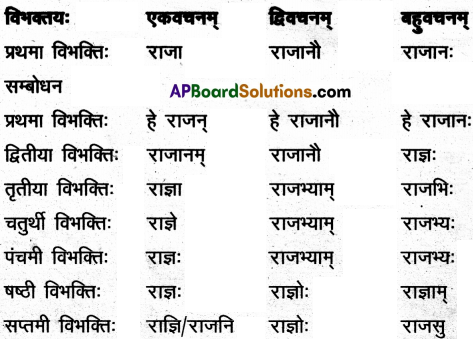
आ) वाक्
समाधान:
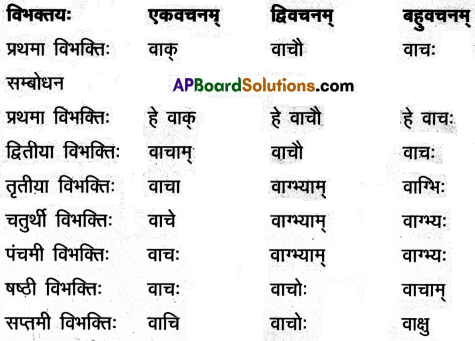
इ) महत्
समाधान:
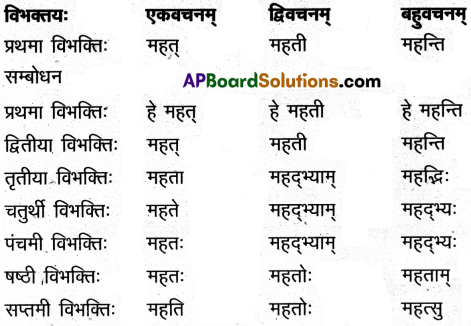
ई) यद् (स्त्री)
समाधान:
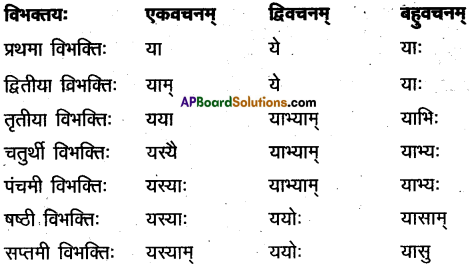
15. समासनामनिर्देशपूर्वकं त्रयाणां विग्रहवाक्यानि लिखत ।
अ) अहिंसा
समाधान:
न हिंसा = नञ् तत्पुरुष समासः
आ) विन्ध्यपर्वतः
समाधान:
विन्ध्यइति पर्वतः = संभावनापूर्वपदकर्मधारय समासः
![]()
इ) त्रिभुवनम्
समाधान:
त्रयानां भुवनानाम् समाहारः = द्विगु समासः
ई) शिवकेशवा
समाधान:
शिवः च केशवः च = द्वन्द्वं समासः
उ) यथाशक्ति
समाधान:
शक्तिम् अनतिक्रम्य = अव्ययीभाव समासः
ऊ) दण्डादण्डि
समाधान:
दण्डैः दण्डैः प्रहृत्य इदं युद्धं प्रवृत्तम् = व्यतिहारलक्षणबहुव्रीहि समासः
16. अधो निर्दिष्ट पट्टिकामाधारीकृत्य पञ्चसाधुवाक्यानि लिखत ।
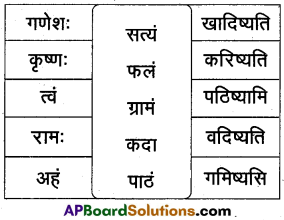
समाधान:
प्रश्ना:
1. गणेशः सत्यं वदिष्यति ?
2. त्वं कदा गमिष्यसि
3. अहं कदा पठिष्यामि ?
4. कृष्णः कदा करिष्यति ?
5. रामः फलं खादिष्यति ?